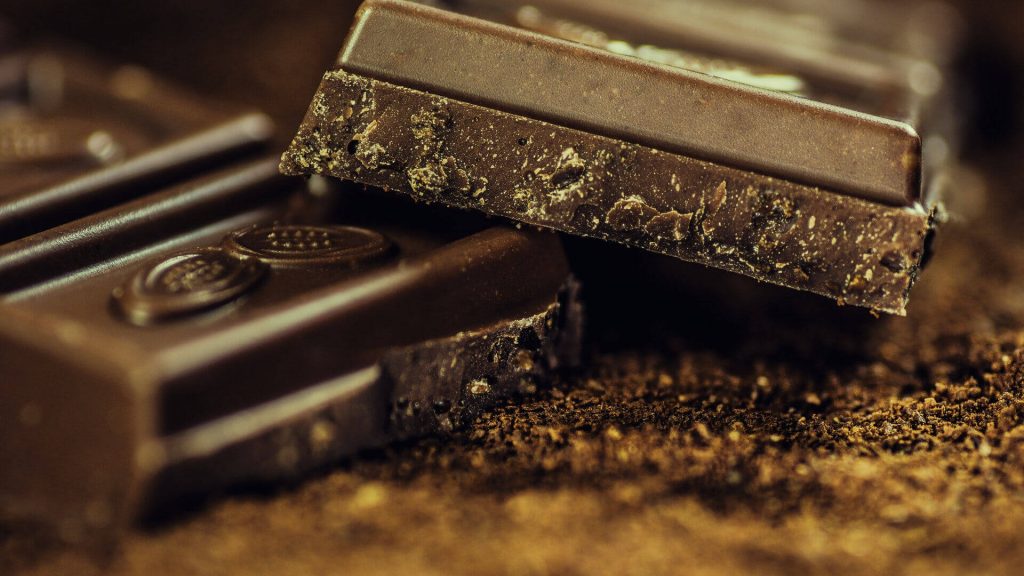Who does not love chocolate? Most people do not need a reason to eat it; it is delicious as an afternoon snack, in cravings moments, in desserts or great to raise one’s spirits. Even so, some people regard it as harmful to health because it contains fats and sugars.
Chocolate comes from cocoa which is one of the best natural sources of antioxidants in the world. Dark chocolate provides excellent health benefits, and the darker it is the greater the benefits, but it must be consumed moderately.
Dark chocolate has only three ingredients in its preparation – sugar, cocoa paste and cocoa butter. Generally, dark chocolate is comprised of 70 to 85 per cent of cocoa (paste and butter), and the rest is sugar. One of the main advantages of this kind of chocolate is it contains flavonoids that help with blood circulation.
The best time to consume dark chocolate is in the morning, at breakfast or as a dessert after lunch, so any extra calories you gain can be burned by daily activities as the body uses them as an energy source.
There are different types of chocolate such as white, dark and with milk, and each brings various benefits, but the most nutritious is dark chocolate. The consumption of chocolate, as with any healthy food, should be accompanied by a healthy lifestyle, physical exercise and balanced diet.
Dark Chocolate is Good for You
Besides being an excellent source of antioxidants, dark chocolate has other benefits:
Significant Nutrients
A 100-gram serving of dark chocolate provides 47 grams of carbohydrates, 5.30 grams of protein and 30 grams of fat. Forty-three grams are sugars that supply a little more than 500 calories. It is rich in fiber – 100 grams contains 15 grams of fiber.
Dark chocolate is source of small amounts of vitamins A, thiamine, riboflavin, niacin, B5, folic acid, vitamin E and K. A 100-gram portion offers 0.92 milligrams of iron, 63 milligrams of calcium, 397 milligrams of potassium, 5.5 milligrams of iodine, 1.4 milligrams of zinc, 100 milligrams of magnesium, 19 milligrams of sodium and 287 milligrams of phosphorus.
Rich in Fiber
One hundred grams of dark chocolate with a cocoa concentration of 70 to 85 per cent can provide 11 to 15 grams of fiber that contributes to the 25 grams of recommended daily intake. Fiber is a carbohydrate that digestive enzymes cannot digest; therefore it is not absorbed, and it moves whole through the digestive tract. There are two fiber groups, soluble and insoluble; dark chocolate provides soluble fiber.
Fiber provides a small energy intake, produces satiety, delays gastric emptying, decreases cholesterol absorption and prevents diseases related to the digestive system such as diverticulosis, diverticulitis and could reduce the risk of colon cancer by preventing substances from carcinogens remain a long time in the intestinal mucosa.
Healthier Heart
Dark chocolate contains antioxidants that promote better blood flow. Also, its anti-inflammatory properties help to reduce chronic vascular inflammation and improve flexibility of blood vessels. It helps to reduce and control blood pressure due to nitric oxide production, which contributes to relaxing the arteries. Eating dark chocolate is beneficial to prevent and diminish cardiovascular diseases.
A Feeling of Wellbeing
When consuming chocolate, serotonin –a neurotransmitter that regulates mood – is released in the brain. It promotes a feeling of calm and wellbeing. A deficit of serotonin can lead to depression.
Good Cholesterol (HDL)
Cocoa butter is an essential ingredient in the preparation of dark chocolate; it contains stearic acid, which the liver transforms into oleic acid. Oleic acid is a compound that helps to reduce bad cholesterol (LDL) levels, and at the same time increases the level of good cholesterol. Another benefit of dark chocolate is that it helps to reduce insulin resistance.
Avoid Strokes
Consumption of dark chocolate helps improve cerebral blood flow, which improves the cognitive process. Regular consumption could prevent strokes due to theobromine, a natural stimulant of lower impact than caffeine which is also present in dark chocolate.
Healthier Skin
Dark chocolate’s antioxidants help to promote a smoother, less dry skin, with greater resistance to UV rays. Cocoa stimulates blood circulation in the capillaries of the upper layer of the skin, allowing for oxygenating and provision of the necessary nutrients the skin needs to protect itself from dehydration and burns.
Good for Your Teeth
A person with good oral health and a good hygiene routine can eat dark chocolate freely because its theobromine content helps to harden tooth enamel, reducing susceptibility to cavities.
Don’t Overdo It
Limit your intake of dark chocolate. Since dark chocolate contributes a lot of calories, it is preferable to eat small quantities. Make sure it is of high quality and that it is 70 to 85 per cent cocoa concentrated. Verify the chocolate is dark and bright brown in color. You should limit consumption to 14 grams (half an ounce) daily.
Check your daily nutrition table and maintain a balanced diet.











